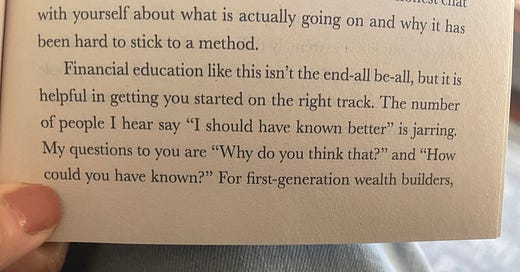PERMA: A handy guide in financially uncertain times - Part 3
Plus: A financial therapist's answer to "I should have known better"
This post has been a long time coming.
It’s about the last two parts of the acronym PERMA.
PERMA, created by psychologist Martin Seligman, attempts to define the sources of human flourishing. PERMA can help us think about how we want to use our resources—our money, our time and our efforts—toward parts of our lives that could use more attention and actually add to our well-being, rather than sinking our resources toward things that don’t necessarily add to our life satisfaction.
The “M” and the “A” stand for: “Meaning” and “Achievement.” (I talk about the other three in these two previous posts):
Here are descriptions of the last two elements of PERMA:
“Meaning: A sense of meaning and purpose can be derived from belonging to and serving something bigger than the self. There are various societal institutions that enable a sense of meaning, such as family, religion, science, politics, work organizations, justice, the community, social causes, among others.
Accomplishment: People pursue achievement, competence, success, and mastery for its own sake, in a variety of domains, including the workplace, sports, games, hobbies, among others. People pursue accomplishment even when it does not necessarily lead to positive emotion, meaning, or relationships.
Each of these five building blocks contributes to well-being and:
Is pursued for its own sake, not as a means to an end
Is defined and measured independently of the other elements.”
I have tried to write about what these two elements of PERMA evoke within me and how they’ve helped me make decisions around my financial and energetic resources. But every time I do, I realize that what comes out is so particular to me that I’m not sure it would be a helpful frame for anyone else.
So I’d like to instead use this space to challenge you, dear reader, to reflect on:
a) Your sources of meaning
b) Your sources of achievement and to what extent they’re intrinsically motivated
c) How you’ve used your resources in the past to support these two categories and whether those contributions were worth it
One more thing to keep in mind from this UPenn article on PERMA:
“There are many different routes to a flourishing life. People will derive well-being from each of these five building blocks to varying degrees.”
If you feel like sharing your thoughts, my DMs and comments are open. I’m much more interested in hearing other people’s reflections on these questions.
Also, my February financial coaching slots (to my delight!) are all filled, but I have open slots in March and April for anyone who’s interested in getting their financial life in order. Feel free to schedule a free 30-minute intro session with me here to learn more.
ETC.
I want to share this story about a man who, despite not reaching great heights in his career (for inane reasons outside of his control) found ways to mark his achievements anyway. I love listening to it every few years.
From Feel-Good Finance by Aja Evans:
Financial therapy for billionaires
“A beggar may feel happy when he imagines himself spending millions. A rich miser, on the other hand, may starve himself in the belief that he is poor.” - B.K.S. Iyengar
Green Money: How To Reduce Waste, Build Wealth, and Create A Better Future For All - Kara Perez/Bitches Get Riches interview
Take care out there,
Bethel






